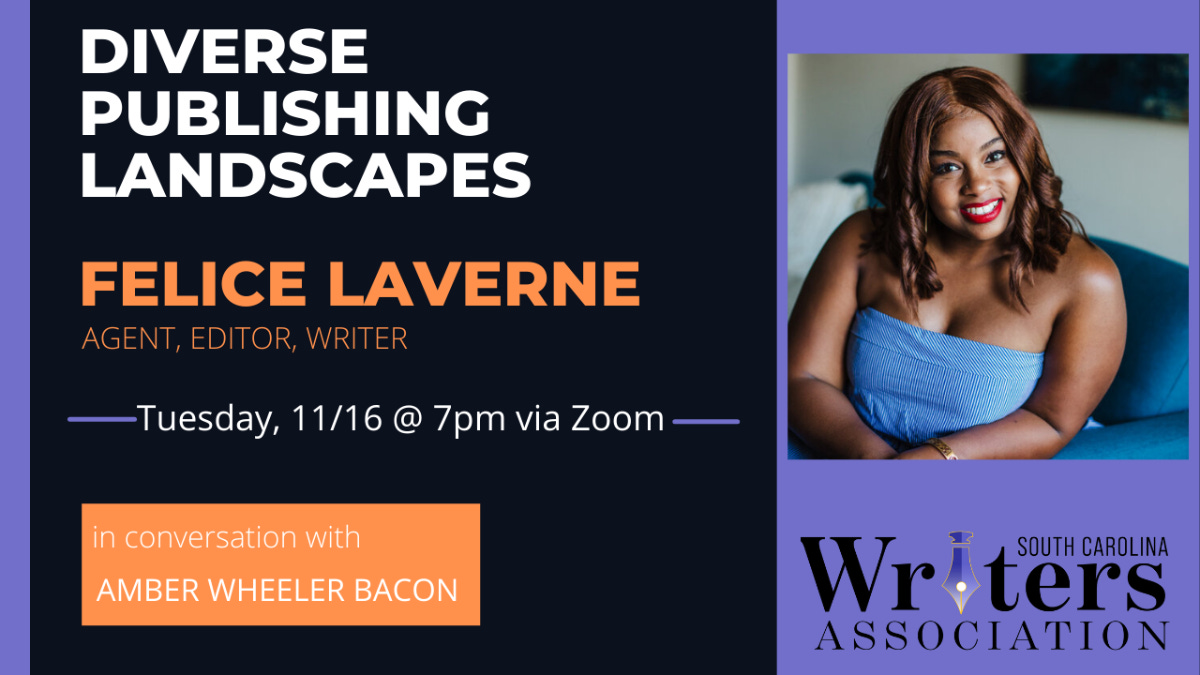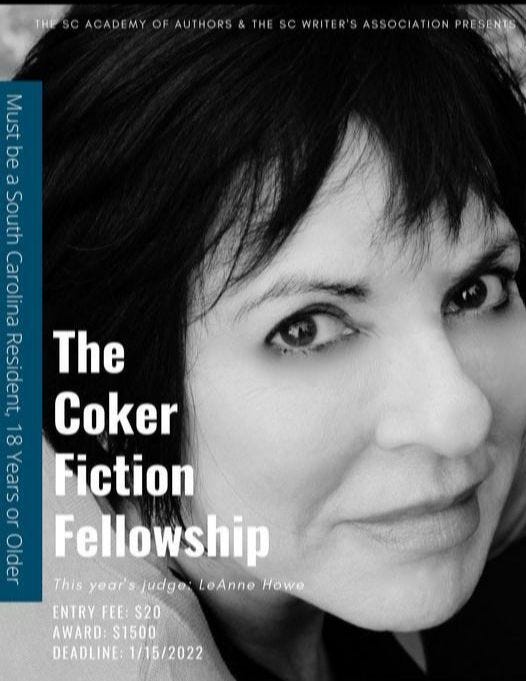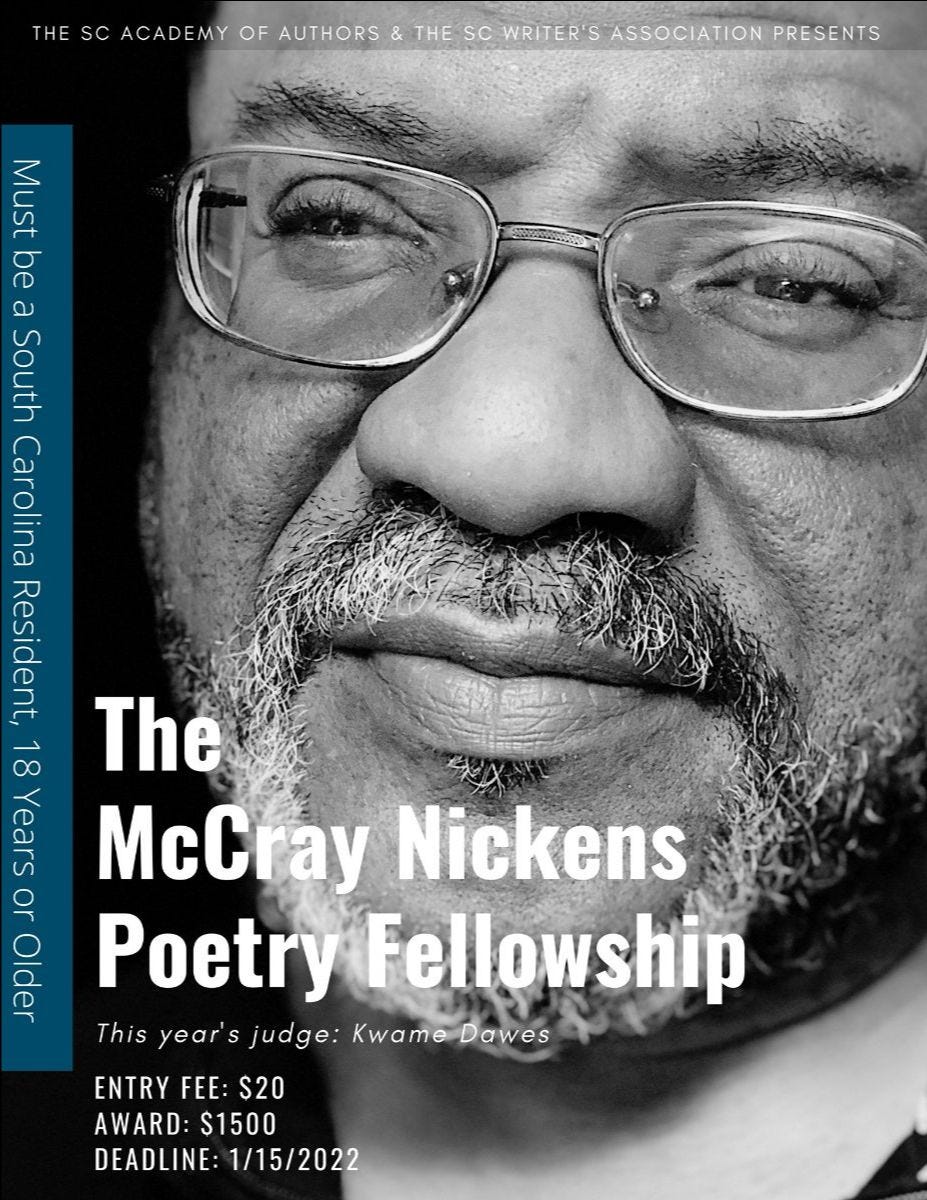The Quill / November 2021

November 2021
Message from the President
One benefit of SCWA’s partnerships with other organizations is that we are able to provide our members with access to those groups and their activities. One Columbia for Arts and Culture is a perfect example.
One Columbia allows SCWA to use its Taylor Street office in Columbia as our mailing address, a tremendous service. We also can use its shared event facility at 1013 Co-Op (1013 Duke Ave. in Columbia), where the SCWA board held its quarterly in-person meeting on Oct. 23. Thanks to One Columbia, a cherished partner.
SCWA members can check out its programs at One Columbia.
The Pat Conroy Center, another major partner, will hold its annual literary festival through Nov. 4 through 7. SCWA members are encouraged to take advantage of the many virtual and in-person programs in Beaufort, many of which are free. You likely will recognize several names of SCWA members involved in the sessions.
Congratulations to SCWA board member Dr. Kasie Whitener, who was awarded a 2021 South Carolina Governor's Fresh Voices in the Humanities Award, sponsored by another SCWA partner, SC Humanities. The ceremony was held on Oct. 21. Tune in to Whitener’s Write On SC weekly radio talk show – all about writing – at 9 a.m. Saturdays on 100.7 FM /1470 AM and Makethepointradio.com.
We remind members to consider joining our board of directors. We need you to become involved to continue the great work of SCWA. The deadline is Nov. 15. Applications are available on MySCWA.org or by emailing writersassociationsc@gmail.com. For more information, email scwritersassociationpresident@gmail.com.
We’ve been pleased with the submissions for guest articles or essays for our "Come Write With Us!" segment of the monthly issue of The Quill and love to showcase the work of our writers. We can’t promise that all submissions will be published, but please keep them coming. Send your submission for consideration to SCWA administrator Laura Corbin at writersassociationsc@gmail.com. (Guidelines: Submissions with a maximum of 500 words can be opinion editorials, poems, essays or a piece of writing in any genre. They cannot be commercial, political or offensive. We reserve the right to edit.)
This month, we feature member Paula Appling of Upstate South Carolina with her essay “Mouse Potato.”
Mike Lee
President
SCWA Board of Directors
Publications
TPR MANAGING EDITOR POSITION
SCWA is seeking a managing editor for its digital literary journal, The Petigru Review. The managing editor will have overall responsibility to produce a high-quality journal and to direct the SCWA team of readers, judges and editors. Ideally a South Carolina resident, candidates should have a love of prose and poetry of all types and styles, preferably with experience as a reader or editor for a literary journal. The ability to navigate and utilize social media and WordPress is desirable.
This position includes a few hours of work a week from March through September with more intensive weeks around the opening of submissions (May) and publication (September). This position is paid a modest honorarium and will report to the SCWA Board of Directors.
If you are interested, send your resume to Mike Lee, president, at scwritersassociationpresident@gmail.com by Dec. 1, 2021.

Events and Education
DIVERSE PUBLISHING LANDSCAPES
Join us at 7 p.m. Tuesday, Nov. 16, via Zoom for Diverse Publishing Landscapes, a conversation between agent, editor and author Felice Laverne and Amber Wheeler Bacon, writer, editor, teacher and literacy coach. They will discuss the role of a sensitivity reader, how to write against stereotypes when writing characters of color, what "diversity in publishing" actually means, the kind of bold and diverse work Laverne is looking for as an agent, how to maximize tension in every scene, what turns her on and off in a query and more. Her twitter handle is @bookgurufelice and a book guru she is!
Register for this FREE event at Virtual Events to receive the Zoom link; space is limited, so register soon.
Laverne's publishing career always has been rooted in championing bold voices and writers from marginalized communities. After obtaining her bachelor's degree in English, creative writing, from Georgia State University, she started her career at About Words Agency immediately after college, where she worked as an agent until leaving to complete her master’s degree in Publishing at Kingston University in London, England. There, Laverne specialized in diversity and inclusion in publishing, which drove her career-long passion for marginalized voices the world had never heard before. After years of partnering with major houses as a book editor and ghostwriter, including having edited phenomenal big-name books such as Zerlina Maxwell's The End of White Politics (Hachette) and Paola Ramos' Finding Latinx: In Search of the Voices Redefining Latino Identity (Vintage), among so many others, she now is back to her roots as a literary agent with a growing list of bold titles. In addition to being an agent and editor, Laverne is also a writer represented by Amanda Orozco at Transatlantic Agency.
Wheeler Bacon has an MFA from the Bennington Writing Seminars and is on the board of directors of SCWA. Her work has appeared in Five Points, Post Road, New Ohio Review, Crazyhorse and Witness. You can find her writing online at Ploughshares, CRAFT, Fiction Writer’s Review and New South. She is the recipient of the 2018 Breakout Writers Prize sponsored by The Author’s Guild and a Bread Loaf Environmental Writers scholarship. Her story collection, We Were Vessels, was one of five finalists for the 2020 Hub City Press C. Michael Curtis Short Story Book Prize and a finalist for Moon City Press 2020 Short Fiction Award. She's been a fiction editor at Four Way Review and a staff reader at Ploughshares. She currently serves as daily editor for the Southern Review of Books and a reader for CRAFT Literary. She teaches English at Coastal Carolina University and is represented by Amy Bishop at Dystel, Goderich & Bourret.
INDIE BOOK FAIR
It's finally here! The Center for Lifelong Learning at the University of South Carolina Aiken invites the public to its inaugural Book Fair on Saturday, Nov. 13. Registration begins at 9:30 a.m. and the fair will conclude at 3 p.m. SCWA is a co-sponsor of this event.
The fair will feature more than 40 regional authors offering their books for sale and also will have a full program of talks on writing and publishing topics. It is scheduled for national Indie Author Day and will celebrate the contributions of independent authors.
The featured speaker is Dr. Kasie Whitener, who hosts the Write On SC radio program on Saturday mornings, serves as board member to the SCWA and was a 2021 recipient of the Fresh Voices in the Humanities Award. Whitener is a business owner and instructor at the University of South Carolina.
Her first two novels, After December and Before Pittsburgh, have won critical acclaim.
Many of the other SCWA members will present or participate on panels at the fair.
The fair will be held in the Business & Education building, adjacent to the Etherredge Center and the Ruth Patrick Science Education Center. Free parking will be available and refreshments will be served. The Center for Lifelong Learning requests a $5 donation to help support its scholarship funds.
For more information and a campus map: Indie Book Fair.
Contest News
MCCRAY NICKENS POETRY, COKER FICTION FELLOWSHIPS
South Carolina writers are invited to submit their works to The McCray Nickens Poetry Fellowship and The Coker Fiction Fellowship presented by the South Carolina Academy of Authors and sponsored by SCWA. Go to SCAA's website for competition details and submit your works here. The deadline for both is Jan. 15, 2022, and each carries a $1,500 prize.


Membership News
2021 SCWA MEMBER SURVEY EXECUTIVE SUMMARY
On Sept. 3, 2021, a 28-question survey was distributed in an email to members of SCWA and in a link in The Quill newsletter. Members had until Sept. 17 to complete the survey. The purpose of the survey was to:
Collect feedback on various programs.
Invite perspectives regarding future programming options.
Better understand the collective interests of SCWA members.
At the time of the survey, SCWA had 379 members. Of that number, 200 members responded to the survey, which equals a response rate of 52 percent. At this rate, it is reasonable to assume the results represent the general sentiments of the broader membership. Highlights of the survey are listed below.
Most SCWA members are relatively new to the organization.
SCWA members are well educated and older.
SCWA members are engaged in a broader writing community that extends beyond the SCWA.
SCWA members are experienced writers.
SCWA members view themselves as good writers and write often.
SCWA writers write across an array of genres and forms.
The 2021 SCWA annual conference met members' expectations.
Virtual delivery has a place in how SCWA delivers programs.
SCWA members value the organization sponsoring an outlet for publishing their work.
SCWA members support growing its membership.
SCWA members display positive feelings toward their organization.
We encourage members to read the full report here: 2021 SCWA Membership Survey Report.Over the past five years, SCWA has enjoyed a period of growth and renewal. The SCWA Board of Directors thanks every member who completed the survey and looks forward to continuing to serve members in the future.
Questions or suggestions about SCWA membership?
Email scwamembership@gmail.com.
Come Write With Us!

Paula Appling is an editor, a designer, a writer and a poet. She loves to hike, backpack and have adventures and is crazy about trees, mushrooms and thunderstorms. She’s worked on a dozen books, contributing everything from light editing to rewriting, to designing and formatting interiors, to designing book covers. She lives with her husband in the Upstate of South Carolina with two cats. She has two adult children.
MOUSE POTATO
Paula Appling
My desire on a recent afternoon was to muse about the evolution of language. As I was browsing words online, I found a great website, TimeTraveler, which organizes words by first year in print. That got my attention.
My birth year, 1957, displayed two screenfuls of words. I was interested to see disco, happy camper, hipsterism, magic mushroom, pop-top, pothead, soul brother and Zen-like. I was surprised to learn that some of these words were introduced in 1957 (such as morning-after-pill, rumble strip and transsexual) because I didn’t know those items were in existence until decades later. Most are still in use today.
Those words piqued my interest and I wondered what a recent year looked like. I learned that only 12 words were introduced into print in 2020, and most of them were COVID-19 related and multiword words: pediatric multisystem inflammatory syndrome and corona virus disease 2019. These multiple-word words certainly spoke of the year, but they weren’t as imaginative, fun or descriptive as those words from 1957.
I was hooked. Further investigation uncovered no new words in print for 2019. Did we not create anything new? The year 2016 listed six new words; one was cancel culture. I scoffed and rolled my eyes at cancel culture, until I realized that when I deactivated my account on Facebook (to express my disapproval), I participated in cancel culture.
Skipping back a generation: 1990 brought about 65 new words to print. I learned that kompromat is "compromising information that is used to blackmail or discredit a person or group usually for political purposes." (Its etymology offers that it's borrowed from Russian kompromat). I decided I shouldn’t judge a year by one word.
I moved to 1923 and found it contained almost three screensful of words. Looking at years on either side, I found they, too, contained a plethora of words. I wondered why so many new words each year 100 years ago, and so few by comparison now? As a society, are we sapiostagnant?
Words first in print in 1923 include dial tone, heebie-jeebies, overplaid ("a textile design consisting of a plaid pattern superimposed on another plaid or on a textured ground") and Unknown Soldier. Thinking out loud to myself: a word remains alive as long as it’s needed. Tie-line ("a telephone line that directly connects two or more private branch exchanges") and drugstore cowboy may be nearing their end of life. But many words first in print in 1923 are still in use, still vibrant, though I hope overplaid died quickly and quietly.
At this point, I’ve spent more than an afternoon investigating words and have over 50 tabs open in my browser. I don’t know whether I’ve been productive, but I’ve had fun, and I have not yet explained mouse potato. Mouse potato was first used in print in 1993 and means "a person who spends a great deal of time using a computer" ...
… analogous to "couch potato" ....



